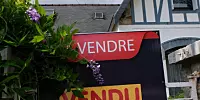-
What are the rules for changing your front door in France?
We review the rules, from planning permission to paint colours
-
Interest rates for loans to buy property in France continue to fall
The drop may help kickstart the market as banks and politicians explore new ways to boost home sales
-
France's new property declaration form: 2024 rules and fines explained
A new deadline is in place for those who have yet to declare - or have moved
House prices, wind farms: Five updates for property owners in France
We also look at a 14-year eviction struggle, mortgage rates and why all tenants of a copropriété could be financially liable for one tenant’s mistake

1. Properties outside Ile-de-France push up market prices
The price of non-new build houses in France in the first quarter of 2022 is relatively stable compared to the end of 2021, with slight increases.
Overall, properties in France were 7.3% more expensive in the first quarter of this year compared to the same period in 2021.
This is a rise of 0.1% compared to the final quarter of 2021, when prices were up 7.2% year-on-year. Read more about that in our article here: Coastal boom, inflation: Six French property trends from notaire data.
The general rise in prices compared to last year is mainly down to people buying houses outside Ile-de-France, inspired by Covid and consecutive lockdowns.
Overall, house prices were up by 9,2% in the first quarter of this year compared to the same period last year, while prices for flats were only up 4.7% year-on-year.
In Ile-de-France, prices for houses and flats combined increased just 2.5% year-on-year in the first quarter of 2022, while outside they increased in price by 9.3%.
This data, reported by France’s national statistics bureau Insee, shows that in general property prices were stable in the first quarter of 2022 compared to the end of 2021.
The number of completed transactions in March over the past 12 months was 1,175,000, slightly down on December’s figure of 1,177,000.
It should be noted that these prices do not yet take into account the effects of Russia’s invasion of Ukraine, which has pushed inflation in May to 5.2% and caused building material costs to soar.
Cost of home DIY projects rises due to shortages: should you delay?
Can tradespeople in France raise price of job after signing a quote?
2. 14-year eviction battle between landlord and tenant
An article in French newspaper Sud Ouest outlines the difficulties of a landlord to expel a tenant who he claims he let stay in a property he was renovating as a temporary measure and with low rent as he was the son of a friend. The saga has been going on for 14 years.
It began in 2008 when Raymond Rolland, who is now in his 80s, bought a property in Chancelade (Dordogne) with some friends which they planned to do up and turn into three flats for them to live in.
An acquaintance then asked if their son, who had recently divorced and needed a place to stay, could live in one of the flats. Mr Rolland said they agreed to let him live there temporarily for €250 per month.
Mr Rolland claims that the tenant chose not to leave.
He later managed to get the property classed as ‘insalubre’, a legal classification meaning the property presents a risk to a person’s health or wellbeing.
Mr Rolland said that he and the other landlords had planned to do up the property once the tenant left but had found no way to get him to leave.
Because of the property being classed insalubre, a court ordered the landlords in 2015 to renovate the property and suspended rent payments - they are still suspended.
“I feel I am in the right, but as the tenant knows all the intricacies, he always gets away with it,” Mr Rolland said.
“It is the struggle of the iron pot against the clay pot.”
Mr Rolland claims that the tenant has blackmailed him, asking for €10,000 to leave the property.
The tenant chose not to speak to Sud Ouest about the matter.
Read more: Two-year squatter ordeal led French landlord to consider hunger strike
Read more: Squatters, sublets and chateaux sales: Five French property updates
Read more: Success of new squatter law in France is 'postcode lottery'
3. Wind farms cause no negative impact on property value, study finds
Wind farms cause no noticeable impact on a property’s value when they are located more than five kilometres away, and only have a very minimal impact if they are closer, a new study published yesterday (June 1) shows.
France’s agency for ecological transition, Ademe, carried out the study to dispel reports that the proximity to wind farms can cause a property’s value to drop significantly.
The agency used statistical data of the sales of detached houses between 2015 and 2020 throughout metropolitan France - equal to 1.5 million sales - and cross-referenced that with data on the location and installation of wind farms.
They combined this quantitative study with an analysis that compared the values of two similar rural properties, one located near wind farms and the other not.
It found that there was zero tangible impact on the price of a property if it is located more than five kilometres from a wind farm.
Closer than that, the study found that a property’s value can decrease by 1.5% per square metre, a drop consistent with properties located close to other industrial sites or infrastructure such as telephone antennas, thermal power plants, landfills, high voltage power lines, etc.
These findings are in contrast to a 2019 report by the Fédération environnement durable, which brings together 1,300 associations and groups opposed to wind power projects in France.
Their study, based on interviews with estate agents, real estate experts, notaries, found that properties located near to wind farms lost 20% of their value, sometimes more.
Bénédicte Genthon, deputy director of sustainable production and energy at Ademe, said of the agency’s recent study:
“It demonstrates that, statistically, property located near wind farms remains a liquid asset. There is no consistent pattern of properties becoming unsellable when a wind farm is built.”
There are around 8,000 on-shore wind turbines in France (including overseas territories) located in 1,380 parks.
4. All tenants in apartment building pay for mistake of one
If one tenant in an apartment building carries out renovation work that is deemed to be a disturbance to neighbours, then all tenants owning flats in the building could be liable to pay the costs, France’s supreme court of appeal, Cour de cassation, has ruled in a recent verdict.
One tenant installed windows, without permission, that overlooked a neighbouring building. The neighbour complained, claiming damages due to trouble anormal de voisinage.
The Cour de cassation agreed and in an April decision ruled that the building’s syndicat was also responsible for not having stepped in to stop the renovation.
It means that all tenants in the building are liable to pay the costs, the extent of which have not been reported.
Read more: French property syndics: What can I do if mine stops responding?
5. Mortgage rates increasing
Mortgage rates are going up quickly in France due to inflation.
The average rate on a 20-year mortgage is currently 1.6%, compared to 1.05% back in January.
This is after a 2021 in which rates were particularly low.
Mortgage broker company Cafpi said that the average rate given in 2021 was 1.1% over 20 years.
Read more: Historic change to mortgage insurance in France starts today
Alexandre Huvenoit, a mortgage broker, told Franceinfo that today people are being refused mortgages – due to their income – that they would have been granted two, three or four years ago.
“Refusals are up 20%”, he said.
Read more: Canal houses, mortgage rule changes: Five French property updates
Read more: Haggling, insurance, leaks: Five updates for property owners in France
Related articles
Virtual tour: 16th-century French chateau at auction for €750,000
Energy certificate rules could see house prices fall in France
























